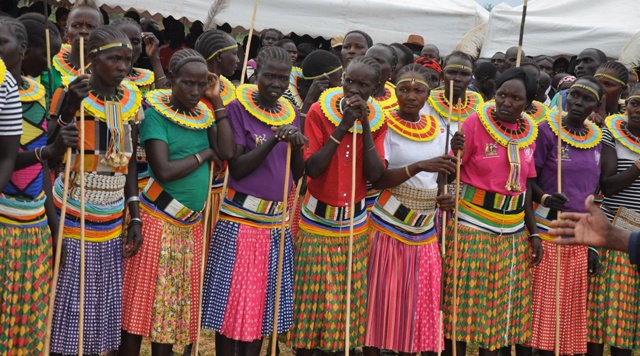
Amudat, Uganda | THE INDEPENDENT | A group of former Karimojong women surgeons in Amudat and Moroto districts have cried out to the government demanding income-generating projects.
Some of the reformed Female Genital Mutilation-FGM surgeons said life is becoming harder, unlike those days when they used to perform the practice.
Grace Chelangat one of the reformed surgeons said since they abandoned FGM, their living conditions have not remained the same and appealed government at least should help them.
“We didn’t want to fight with the government, because when the government banned the FGM we stopped so we expected the government to have given us the surgeons some projects to generate income,” she said.
Naputuka Angolere the former chief FGM surgeon for Tepeth in Moroto district says that in 2012, the government promised to give 5 Million Shillings on grounds that they stop the practice.
“It is the government who knows that the FGM is bad but for us we know it’s not bad and it’s part of our culture, but when the government told us to stop, we respected because you can’t fight the government but have not helped us also with source income-generating projects,” she said.
Joyce Chegem another surgeon in Loro Sub County in Amudat district says that they used to charge 100,000 Shillings with two goats per girl and 200,000 Shillings with one cow per married woman.
“We want the government to come for our rescue because we don’t want to go back and begin cutting girls like what others do in Kenya, we need some projects to help us survive,” she said.
FGM is a procedure where the female genitals are deliberately cut, injured or changed, but where there’s no medical reason for this to be done.
It’s a ritual practice to initiate a girl into womanhood during the exercise; a cow and goat are killed to celebrate. The surgeon is invited to the girl’s home and the girl is asked to go up the hill with a stone on which she sits with her head held up high and legs spread wide for the cutter to circumcise her. There are usually at least eight girls circumcised on any given day during the season using one sharp object.
The practice is done by the Sabiny community in the districts of Kapchorwa, Kween and Bukwo where 50 percent of women and girls undergo FGM. Among the Pokot in the districts of Amudat, Nakapiripirit and Moroto, 95 percent of women and girls undergo the practice.
According to the United Nations Population Fund-UNFPA, an agency championing the fight against FGM in the region, since 2010 when the FGM Act was enacted, mutilators are now shying away from the practice.
In 2010 the government passed a law against the FGM practice.
Frank Mugabi the communication officer in the ministry of Gender advised the reformed surgeons to form a group and apply for money under Uganda Women Entrepreneurship Funds.
“They shouldn’t cry because the money is there what they should only do is to form a group and apply for money under women entrepreneurship,” he said.
********
URN
 The Independent Uganda: You get the Truth we Pay the Price
The Independent Uganda: You get the Truth we Pay the Price





